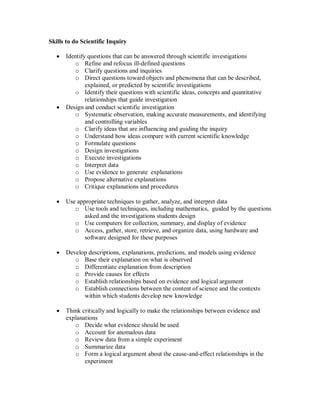
Scientific Inquiry Skills
- 1. Skills to do Scientific Inquiry Identify questions that can be answered through scientific investigations o Refine and refocus ill-defined questions o Clarify questions and inquiries o Direct questions toward objects and phenomena that can be described, explained, or predicted by scientific investigations o Identify their questions with scientific ideas, concepts and quantitative relationships that guide investigation Design and conduct scientific investigation o Systematic observation, making accurate measurements, and identifying and controlling variables o Clarify ideas that are influencing and guiding the inquiry o Understand how ideas compare with current scientific knowledge o Formulate questions o Design investigations o Execute investigations o Interpret data o Use evidence to generate explanations o Propose alternative explanations o Critique explanations and procedures Use appropriate techniques to gather, analyze, and interpret data o Use tools and techniques, including mathematics, guided by the questions asked and the investigations students design o Use computers for collection, summary, and display of evidence o Access, gather, store, retrieve, and organize data, using hardware and software designed for these purposes Develop descriptions, explanations, predictions, and models using evidence o Base their explanation on what is observed o Differentiate explanation from description o Provide causes for effects o Establish relationships based on evidence and logical argument o Establish connections between the content of science and the contexts within which students develop new knowledge Think critically and logically to make the relationships between evidence and explanations o Decide what evidence should be used o Account for anomalous data o Review data from a simple experiment o Summarize data o Form a logical argument about the cause-and-effect relationships in the experiment
- 2. o Begin to state some explanations in terms of relationship between two or more variables Recognize and analyze alternative explanations and predictions o Listen to and respect the explanations proposed by other students o Remain open to and acknowledge different ideas and explanations o Accept the skepticism of others o Consider alternative explanations Communicate scientific procedures and explanations o Become competent at: communicating experimental methods following instructions summarizing the results of other groups telling other students about investigations and explanations Use mathematics in all aspects of scientific inquiry o Use Mathematics to ask questions, to gather, organize, and present data; and to structure convincing explanations Skills in Identifying Some Science Principles Describe, measure or classify observations State or recognize science principles Demonstrate relationships among closely related science principles Demonstrate relationships among different representations of principles Skills in Using Science Principles Explain observations of phenomena Predict observations of phenomena Suggest examples of observations that illustrate a science principle Propose, analyze, and evaluate alternative explanations or predictions Skills in Scientific Inquiry Generate new questions that can be investigated in the laboratory or field Critique aspects of scientific investigation Conduct investigations using appropriate tools and techniques Identify patterns in data: relate patterns to theoretical models Describe a reason for a given conclusion using evidence from an investigation Explain how scientific evidence supports or refutes claims or explanations of phenomena
- 3. Design and conduct a scientific explanation with a hypothesis, several controlled variables and one manipulated variable. Gather data and organize the results in graphs, tables and/or charts Skills in Reflection and Social Implications Critique whether questions can be answered through scientific investigations Identify and critique some arguments based on scientific evidence Use appropriate scientific knowledge in arguments, recognizing their limitations Gather, synthesize and evaluate information from multiple sources Discuss scientific topic in groups, make presentations, summarize what others have said, ask for clarifications, take alternative perspectives, and defend a position Evaluate the future career and occupational prospects of science fields Explain why a claim or a conclusion is flawed Critique solutions to problems, given criteria and scientific constraints Identify scientific tradeoffs in design decisions and choose among alternative solutions Apply principles or scientific data to anticipate effects of technological design decisions Skills based on the Student Handbook Identify a question Gather and organize information o Research Information o Evaluate Sources of information o Interpreting scientific illustration o Make models Formulate hypothesis o Predict o Design an experiment Test the hypothesis o Identifying and manipulating variables and controls Collecting data o Observe o Estimate o Measure o Form operational definition(s) Analyze the data o Interpret data o Classify data o Compare and contrast o Recognize cause and effect
- 4. o Draw conclusions o Infer o Apply o Making unbiased judgment Communicate results of experiments/studies
